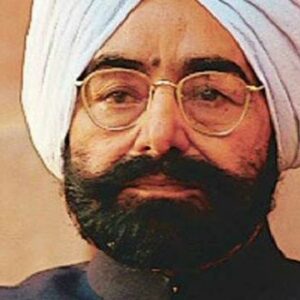Gyani Zail Singh, the seventh President of the Republic of India, was the country’s first Sikh to hold the position. Despite his lack of any secular education, he was a very devout man with extensive knowledge of the Guru Granth Sahib. He was a civil rights activist and social reformer who sympathized with the oppressed and tried everything in his power to improve society. He was engaged in politics since he was a child, and the martyrdom of Bhagat Singh and his friends, who lost their lives fighting for the country’s liberation, had a profound impact on him. Zail, who was just 16 years old at the time of the occurrence, vowed to follow in their footsteps and contribute to his country’s wellbeing. He was regularly imprisoned, including in solitary confinement, for his ardent participation in nationalist movements. Nothing, however, could break the tenacious man’s spirit. As luck would have it, this ambitious politician quickly joined the Indian National Congress and rose through the ranks of the government to become India’s president.
Childhood and Adolescence
He was born into a poor family in the Faridkot area of Punjab, India, in a mud hut. His father’s name was Bhai Kishan Singh and his mother was Mata Ind Kaur. His father worked as a carpenter in the hamlet. He was the youngest of six children, with five brothers and one sister. While his mother died when he was a youngster, tragedy shook the close-knit family. Later, the children were raised by their mother’s sister.
His family, despite their poverty, had a little plot of land to work. Zail Singh’s family raised him in a devout setting, and he was well-versed in the Sikh sacred writings at a young age. Despite the fact that he did not have a matriculation certificate, he was accepted into the Shahid Sikh Missionary College in Amritsar as a teenager. He was, nevertheless, a self-assured young guy who had mastered the art of public speaking.
Because of his mastery of the Guru Granth Sahib and his considerable instruction in religious studies, he was given the title “Gyani” while in college. He spoke Punjabi and Urdu well and could hypnotize an audience with his oratory talents. The British executed Bhagat Singh and his friends Sukhdev and Rajguru in 1931 for their radical nationalist efforts. The tragedy had a significant influence on Zail Singh, who was just 15 at the time.
Career of Zail Singh
He had been interested in politics since he was a teenager, joining the Shiromani Akali Dal when he was just 15 years old. By the late 1930s, when he was in his twenties, his political ambitions had taken on fresh vigor. In 1938, he founded the Praja Mandal, a Faridkot-based political group affiliated with the Congress party. The Maharaja of Faridkot, who considered the formation of a Congress chapter in the city as a challenge to his sovereignty, was not pleased.
Zail Singh was apprehended and detained. He was held in solitary prison for five years and tortured for his political activity. Despite this, the young guy never lost hope and clung tenaciously to his beliefs. He was appointed as the Revenue Minister of the newly established Patiala and East Punjab States Union after India’s independence (PEPSU). His assistance to PEPSU farmers in reducing disparities and ensuring their rights were enormous.
In 1951, he was appointed Minister of Agriculture after serving as the Revenue Minister of PEPSU.
PEPSU was merged with the state of Punjab in 1956, and Zail Singh was elected to the Rajya Sabha, where he served until 1962.
The Congress won the Punjab Assembly elections in 1972, and Giani Zail Singh was elected Chief Minister of Punjab. He arranged for a lifelong pension program for Punjabi freedom warriors, having been a freedom fighter himself. He was also a devout Hindu who conducted large religious gatherings and had a highway named after him.
In 1980, he became Minister of Home Affairs in Indira Gandhi’s government, and in 1982, he was elected President. His adversaries, on the other hand, believed he was chosen as President because he was an Indira supporter rather than because of his qualifications.
When Operation Blue Star occurred in June 1984, he was accused of being a mute observer. Zail Singh could do little as government forces invaded the Harmandir Sahib, the Sikhs’ holiest shrine in Amritsar, causing widespread slaughter. After Indira Gandhi’s assassination in October 1984, her son Rajiv Gandhi was named Prime Minister, and he faced a tough period. Despite serving as president from 1977 to 1987, he never got along with Rajiv Gandhi.
Major accomplishments of Zail Singh
From 1982 until 1987, Gyani Zail Singh was India’s eighth President. He was the first Sikh to serve in this capacity. However, his administration was marred by controversies such as Operation Blue Star and anti-Sikh rioting in the aftermath of Indira Gandhi’s assassination.
Personal History and Legacy
He had one son and three daughters with Pardhan Kaur, whom he married. In November 1994, he was engaged in a car accident in which he was gravely injured. On December 25, 1994, he died as a result of his injuries.
Estimated Net Worth
The estimated et worth of Zail Singh is $1.4 Million.


